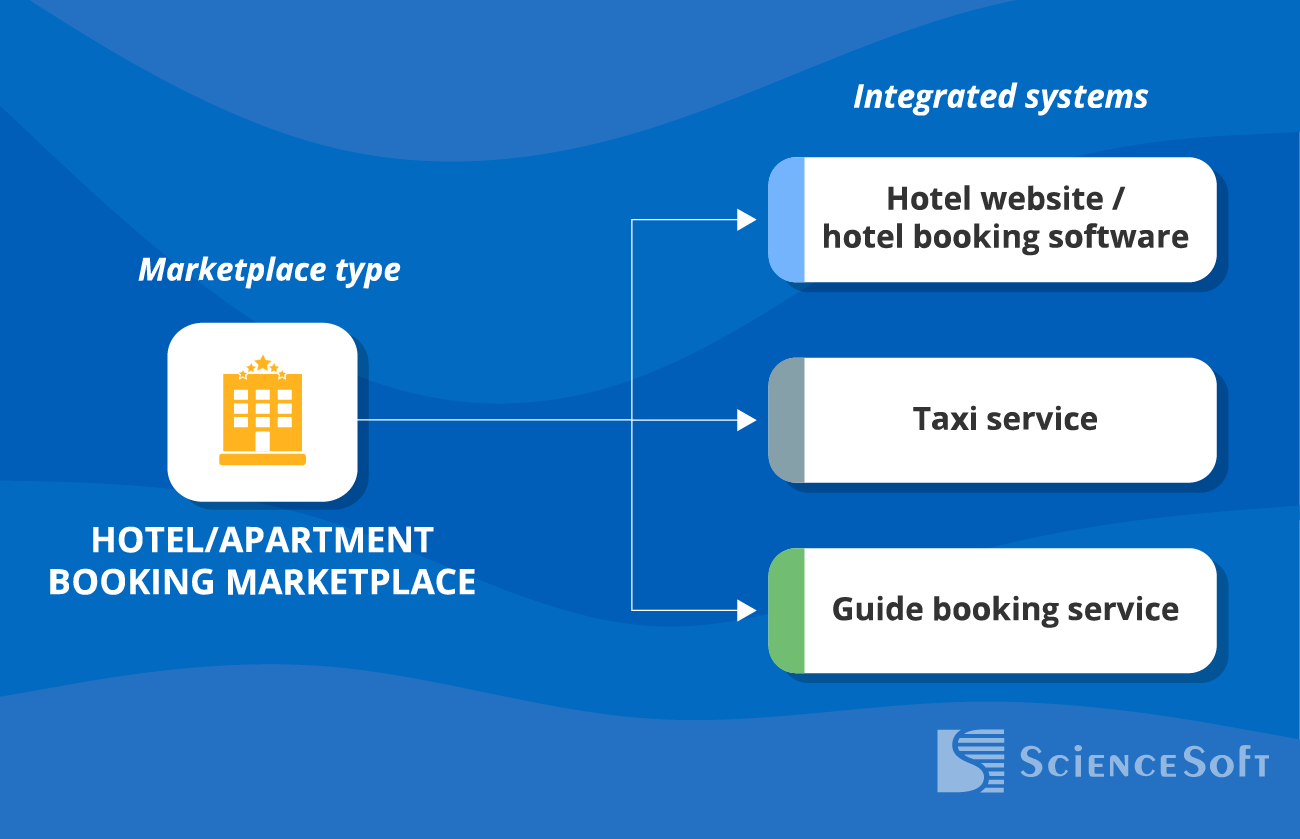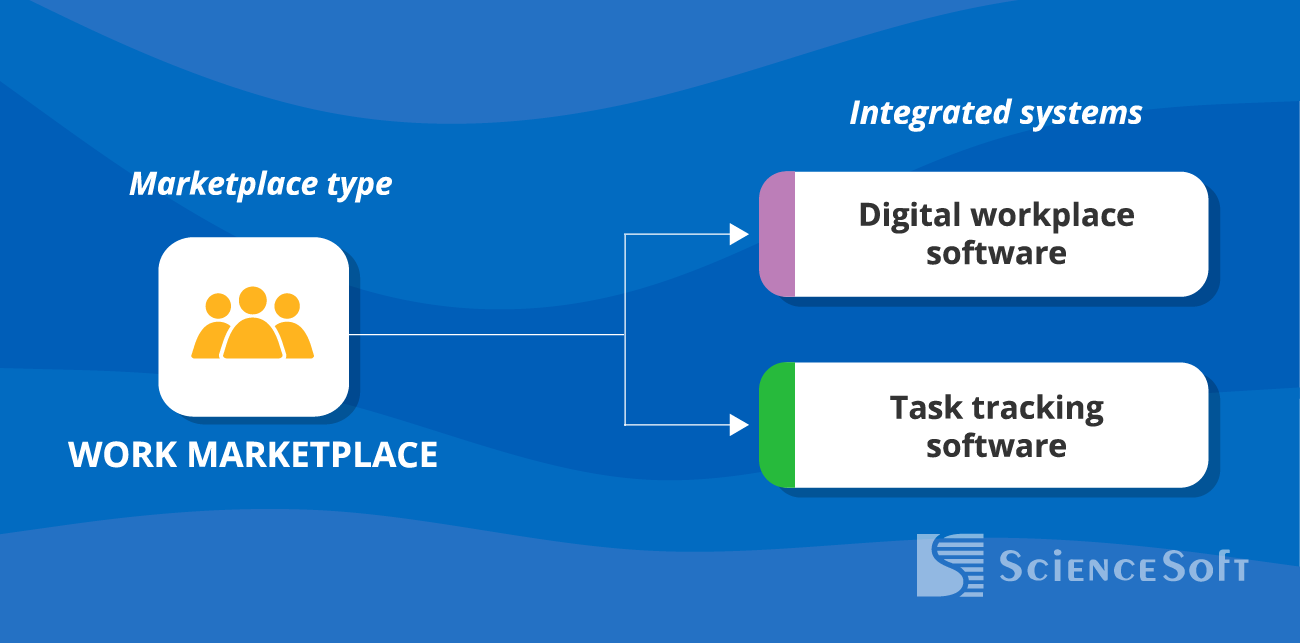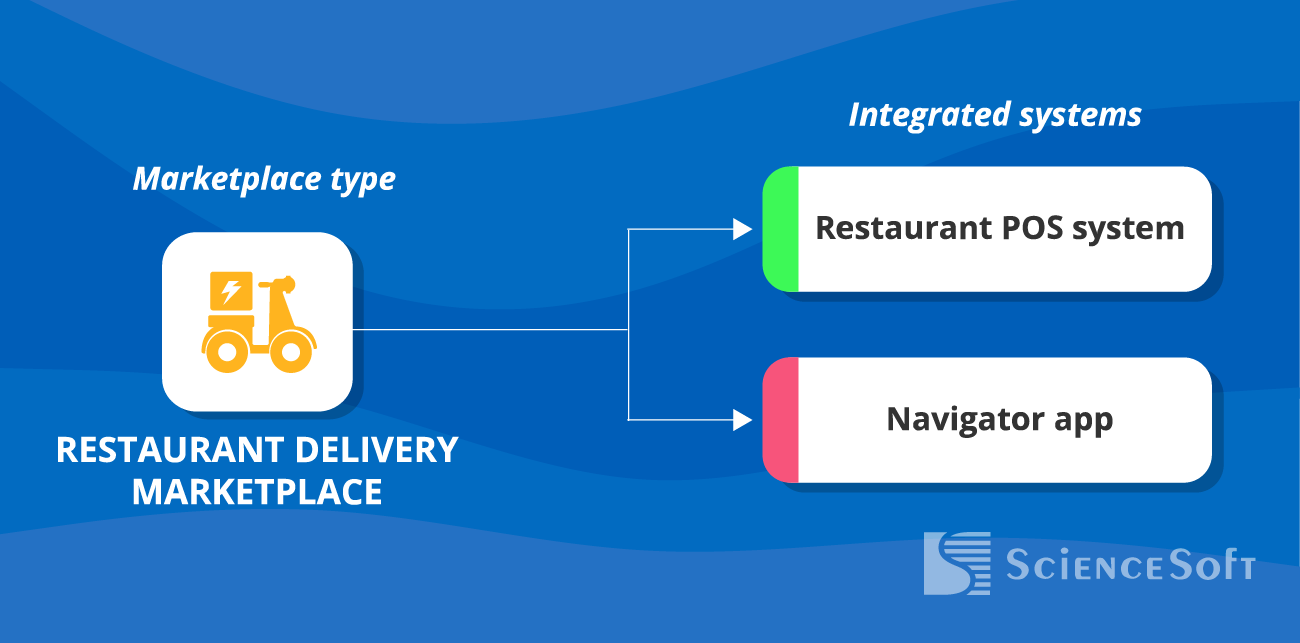Service Marketplace Development Guide
Features, Timelines, Costs
In ecommerce software development since 2003, ScienceSoft builds custom service marketplaces with scalable architectures, secure transactions, and seamless UX for both service providers and clients.
Service Marketplace Development: Highlights
A service marketplace is a platform that aggregates the offerings from numerous service providers and helps them connect to potential clients. Here is a brief summary of what we will discuss in the guide:
- Marketplace functionality should be adapted to two different user roles: buyers and sellers.
- Integrations with third-party systems are needed to add extra convenience for marketplace users. Integrations will depend on the service field (e.g., restaurant POS systems for a food delivery marketplace).
- Typical project steps involve discovery, requirements engineering, UX and UI design, project planning, development & testing, and launch.
- Development costs range between $100,000 and $200,000 for a custom solution.
Key Marketplace Features
When planning the functionality of a service marketplace, ScienceSoft’s consultants recommend using these core features as a foundation and adding the rest based on the specifics of the services.
Seller registration
requires the submission of personal/business information of a seller. We add a possibility to securely upload scans of identity or business registration documents to verify a seller’s legitimacy. Two-factor authentication secures sensitive information.
Seller verification
is usually done manually by the marketplace administrator who reviews the seller information and triggers subsequent processes (approval, rejection, or requesting additional documents). If you expect high demand or fast turnover of sellers and want to control this process efficiently, consider AI-powered image recognition to automate the processing of submitted docs.
Seller profile
must contain comprehensive first-hand information submitted by a seller, their customer rating, and buyer reviews.
Buyer registration
should also include two-factor authentication to protect a buyer’s personal and payment data. We also recommend adding registration via social media to help buyers sign up and start using the marketplace faster.
Buyer profile
must contain general information about a buyer and the history of their previous orders with a status (paid/unpaid, completed/in progress).
Service listings
are created and updated by sellers following a unified step-by-step process set up by the marketplace owner. Listings should contain service descriptions, pricing, availability, and other relevant info.
Service pricing
can be either fixed (set by a seller) or dynamic. To set up dynamic pricing, you need to define price determinants and a set of calculation rules (e.g., the trip cost in Uber is based on the distance, the estimated trip time, and the demand level).
Service search
can be operated by users (by filtering available offerings) or automatically managed by the system based on a chosen criterion (e.g., a user’s location for a taxi service).
Service booking
is available to buyers who choose the service they need and proceed to a checkout page with an order summary and payment details.
Payments
can be either direct (sellers receive the payments from buyers and pay a fixed marketplace fee) or aggregated (a marketplace receives the payments from buyers, withdraws the fee, and deposits the profit to the seller).
Order management
is done by sellers via a dashboard where all new buyer requests are recorded. Sellers can confirm, reject, and edit the requests.
Reviews and ratings
may be available to buyers only (e.g., for restaurant food delivery) or to both sellers and buyers (e.g., for a taxi service). Buyers can provide feedback on the quality of a seller’s service, and sellers can rate the buyers.
Direct buyer-seller communication
is usually provided via instant messaging (in-app chats or integrated third-party messengers). Sometimes, phone calls must be supported, which requires VoIP integration.
User support center
must be available to users to ask questions, get help in challenging situations, escalate conflicts and disputed situations to a marketplace admin. As a rule, we also offer to create a comprehensive knowledge center and/or a chatbot for users to get answers without human help.
Admin panel
is a space where marketplace administrators moderate user-generated content and sellers’ profiles, resolve disputes, and in general monitor the performance and financial analytics of the marketplace.
How to Deliver Value to Service Marketplace Users
Users look for convenience above anything else, so it’s important to deliver a tailored experience based on the type of services you sell. One of the ways to do it is to set up integrations with third-party systems and apps associated with a specific service field. Let’s check the examples:
|
|
Hotel/apartment booking marketplaceHotels or apartment hosts benefit from integrating their marketplace listing with their own booking system:
Hotel guests will welcome marketplace integrations with other apps for traveling (like flight ticket booking, taxi, or sightseeing services). |
|
|
Work marketplaceEmployers and freelancers benefit from integrating a job marketplace with a digital workplace and task tracking tool:
|
|
|
Restaurant delivery marketplaceRestaurants benefit from synchronizing their menu updates with the marketplace and getting marketplace orders instantly registered in their POS system. Marketplace couriers benefit from having delivery addresses automatically added to their navigator app and getting an optimal route planned instantly. |
6 Steps to Build Your Service Marketplace
In ScienceSoft’s projects, we manage to save about 10–20% of project costs by setting up an organized software development process and maintaining the high quality of deliverables, which helps avoid delays and overbudgeting. While no two projects are the same, our high-level plan for service marketplace development usually looks like this:
1.
Discovery
To understand how to translate a business idea into reality, we usually start by analyzing:
- The target audience’s needs and expectations that we should meet.
- Competitors on the market, their strong sides and weaknesses.
- The nature of the services you want to sell, if they are local or international, fully remote or requiring physical presence.
I see an in-person interview during the discovery stage as a priority. Sometimes, a single phrase in the conversation with the project's stakeholders can lead to defining the key value proposition of a created product.
2.
Requirements engineering
To create a complete software requirements specification, we:
- Prepare a functional specification.
- Describe non-functional requirements for the marketplace: usability, scalability, security, performance, localization, and more.
- Design a marketplace architecture that fulfills all functional and non-functional requirements.
- Plan the needed integrations with third-party systems and services.
- Select the technology stack.
3.
UX and UI design
To make user experience one of the marketplace’s key competitive advantages, we:
- Describe user personas based on the analysis of the target audience.
- Design a system of filters for service search.
- Plan intuitive user journeys.
- Create UI mockups with a focus on strong brand identity.
4.
Project planning
Once we have fully planned a marketplace solution, we get down to the organizational details of the project. We must decide on:
- The team composition.
- The sourcing model (outsourced vs. in-house development).
- The project roadmap with key milestones and budget.
- The communication and reporting schedule and tools.
- The project risk mitigation strategy.
We always strive to optimize the project cost. As one of the ways to take a rational approach to budget allocation, we offer to build a marketplace MVP with essential features to start getting ROI early.
5.
Development
To speed up the development process and release an MVP faster, we work iteratively in 2-4-week sprints. At this stage, we:
- Set up a secure development environment.
- Code the front-end and back-end layers of the application.
- Implement security controls (e.g., two-factor authentication, end-to-end data encryption).
- Integrate the marketplace application with the required systems.
- Conduct unit testing throughout the development process to detect bugs early on.
- Perform comprehensive QA in parallel with development to verify the functionality, performance, security, and usability of the marketplace.
6.
Launch and evolution
Upon the launch of your marketplace, it’s important to monitor user behavior and collect feedback to spot opportunities for further improvement. To make sure your app stays relevant in the long run, it’s important to conduct regular maintenance and upgrade the features according to the changing user expectations.
If you decide to treat your marketplace as set in stone after the launch, it will feel outdated in a year or two. Moving along with market fluctuations and changes in consumers' habits is critical to stay relevant.
How Much Does Service Marketplace Development Cost?
|
|
Though each project is unique, we can share our experience from similar projects we’ve done. The cost of service marketplace development ranges between $100,000 and $200,000. The final figure will depend not only on your marketplace's functionality, design, and integrations but also on the platforms you target (web, native mobile, or cross-platform mobile). |
How a Marketplace Delivers Value and Earns ROI
To be attractive for sellers and buyers, a service marketplace offers the following benefits.
|
|
A marketplace provides sellers with a high-traffic marketing channel. The service marketplace giants attract millions of users: for instance, Airbnb has 100+ million monthly visitors, Upwork – 50+ million. |
|
|
A marketplace provides buyers with a single space aggregating thousands of service offerings and ensuring the security of transactions. |
A service marketplace can be monetized in several ways:
|
|
A fee-based monetization strategy. A marketplace charges a percentage-based fee (usually 3-10%) included in the service cost. A fee can be charged for each transaction (one-time payment) or for a service subscription (monthly or annual payment). |
|
|
Featured listings. A marketplace sells top positions on the homepage or in the service listings to boost a seller’s visibility to clients. |
|
|
Advertising. A marketplace incorporates ads and charges fees on a pay-per-click (PPC) or impression basis. |
The Feedback We Got on the Project
We appreciated [ScienceSoft’s] client-oriented approach, consistent collaboration across all the project stages, and flexibility to adjust to changes. ScienceSoft’s expert advice helped us reveal cost optimization opportunities and define the functionality to increase the solution’s value for all target user groups. We believe ScienceSoft has contributed a lot to speed up our marketplace’s release.”

Bader Alhamdan, Managing Director at Deyarat Trading Co
Need a Truly Committed Partner to Realize Your Marketplace Idea?
For 36 years in software development, ScienceSoft has worked with 1,400+ companies and always strived to bring maximum business value to each of our clients. Let’s talk specifics to see how we can help you launch a winning marketplace that will be loved by service providers and buyers alike.

About ScienceSoft
ScienceSoft is a full-service IT company that helps businesses worldwide digitize their operations. For 22 years, ScienceSoft has worked with digital commercial channels and has solid experience in online marketplace development. Achieving project goals in spite of time and budget constraints, as well as changing requirements, is ScienceSoft's top priority. You set goals, we drive the project to fulfill them.






